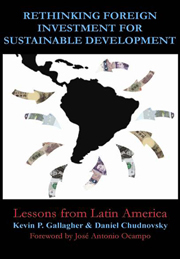Book contents
- Frontmatter
- Contents
- List of Figures
- List of Tables
- Foreword
- Acknowledgements
- Author Biographies
- Rethinking Foreign Investment for Sustainable Development
- 1 FDI and Sustainable Development in the Americas
- 2 Is Foreign Investment Always Good for Development?
- Part 1 Country Assessments
- Part 2 Political Economy of Natural Resources and The Environment
- Notes
- References
- Index
1 - FDI and Sustainable Development in the Americas
Published online by Cambridge University Press: 05 March 2012
- Frontmatter
- Contents
- List of Figures
- List of Tables
- Foreword
- Acknowledgements
- Author Biographies
- Rethinking Foreign Investment for Sustainable Development
- 1 FDI and Sustainable Development in the Americas
- 2 Is Foreign Investment Always Good for Development?
- Part 1 Country Assessments
- Part 2 Political Economy of Natural Resources and The Environment
- Notes
- References
- Index
Summary
Since the early 1980s nations in Latin America have been implementing a cluster of deep reforms to their economies. Referred to in the United States as the Washington Consensus and in Latin America as “neoliberalism,” the reforms include a package of economic policies intended to promote economic development by opening national economies to global market forces. Over the last twenty-five years, governments throughout Latin America have reduced tariffs and other protectionist measures, eliminated barriers to foreign investment, restored “fiscal discipline” by reducing government spending and promoted the export sector of the economy (Williamson 1990).
Now, after 25 years of free-market reforms, many citizens in the hemisphere—and some governments—are questioning the wisdom of the Washington Consensus. Indeed, between October 2005 and December 2006, sixteen Latin American nations held either presidential or congressional elections. Nearly all of these contests have been referred to as referendum on the reforms. In many of the region's most significant economies—Argentina, Bolivia, Brazil, Chile, Uruguay, and Venezuela, candidates critical of the Washington Consensus prevailed. In other nations the outcome of the vote was so close that right-leaning governments at the very least have no mandate to deepen existing reforms.
This sea change in Latin American democracy has been portrayed in the Western press as an irrational resurgence by protectionists. However, a closer look at the record of the Washington Consensus shows that the concerns of citizens and governments can be justified.
- Type
- Chapter
- Information
- Rethinking Foreign Investment for Sustainable DevelopmentLessons from Latin America, pp. 1 - 20Publisher: Anthem PressPrint publication year: 2009
- 1
- Cited by



